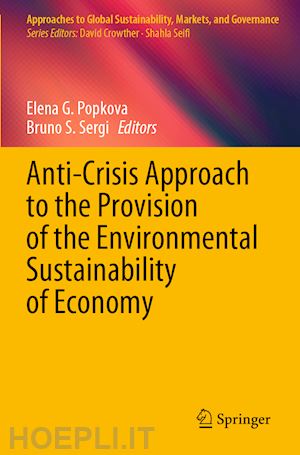

Questo prodotto usufruisce delle SPEDIZIONI GRATIS
selezionando l'opzione Corriere Veloce in fase di ordine.
Pagabile anche con Carta della cultura giovani e del merito, 18App Bonus Cultura e Carta del Docente
This book focuses on the notion of the environmental sustainability of the economy. The Sustainable Development Goals, formulated by the UN, led to the formation of a concept of the environmental sustainability of the economy. This concept implies the harmony of economy and environment, achieved due to the support for the SDGs in the economy. This book is original due to its reconsidering the environmental sustainability of the economy from the position of crises.
The theoretical significance of the book consists in the development of an anti-crisis approach to the provision of the environmental sustainability of the economy: responsible nature use based on digital markets and smart governance. The proprietary approach allows for the comprehensive description of the potential of the leading technologies—artificial intelligence (AI), robots, the Internet of Things (IoT), and blockchain—to support—during their use in smart governance—crisis management of the environmental sustainability of economy.
The book’s practical significance is due to the description and detailed discussion of the modern international experience of responsible nature use given the specifics of developed and developing countries. The anti-crisis approach to the provision of the environmental sustainability of the economy is based on digital markets: FinTech, EdTech, GovTech, AgroTech, and EnergyTech, the practice of which is described in the book with the help of multiple examples from the international experience and case studies.
The book is aimed at scholars who study environmental economics. In this book, they find an innovative view of the environmental sustainability of the economy in its close connection with economic crises.
Bruno S. Sergi is an instructor at Harvard University, where he is alsoa faculty affiliate at the Center for International Development and an associate at the Harvard Davis Center for Russian and Eurasian Studies and the Harvard Ukrainian Research Institute. He is a full professor at the University of Messina, Italy. His research and teaching interests tie to the broader topic of the economics of emerging markets. In addition, he is the co-director of the Lab for Entrepreneurship and Development (LEAD), a research laboratory based in Cambridge (USA) that aims to generate and share knowledge about entrepreneurship, development, and sustainability.











Il sito utilizza cookie ed altri strumenti di tracciamento che raccolgono informazioni dal dispositivo dell’utente. Oltre ai cookie tecnici ed analitici aggregati, strettamente necessari per il funzionamento di questo sito web, previo consenso dell’utente possono essere installati cookie di profilazione e marketing e cookie dei social media. Cliccando su “Accetto tutti i cookie” saranno attivate tutte le categorie di cookie. Per accettare solo deterninate categorie di cookie, cliccare invece su “Impostazioni cookie”. Chiudendo il banner o continuando a navigare saranno installati solo cookie tecnici. Per maggiori dettagli, consultare la Cookie Policy.